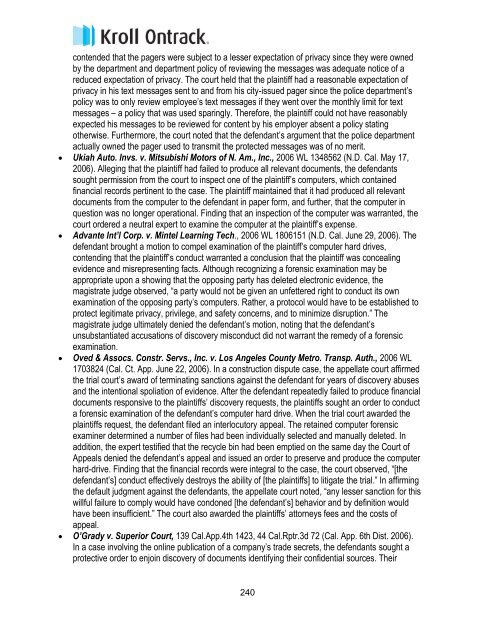Electronic Discovery and Computer Forensics Case List - Kroll Ontrack
Electronic Discovery and Computer Forensics Case List - Kroll Ontrack
Electronic Discovery and Computer Forensics Case List - Kroll Ontrack
Create successful ePaper yourself
Turn your PDF publications into a flip-book with our unique Google optimized e-Paper software.
contended that the pagers were subject to a lesser expectation of privacy since they were owned<br />
by the department <strong>and</strong> department policy of reviewing the messages was adequate notice of a<br />
reduced expectation of privacy. The court held that the plaintiff had a reasonable expectation of<br />
privacy in his text messages sent to <strong>and</strong> from his city-issued pager since the police department’s<br />
policy was to only review employee’s text messages if they went over the monthly limit for text<br />
messages – a policy that was used sparingly. Therefore, the plaintiff could not have reasonably<br />
expected his messages to be reviewed for content by his employer absent a policy stating<br />
otherwise. Furthermore, the court noted that the defendant’s argument that the police department<br />
actually owned the pager used to transmit the protected messages was of no merit.<br />
� Ukiah Auto. Invs. v. Mitsubishi Motors of N. Am., Inc., 2006 WL 1348562 (N.D. Cal. May 17,<br />
2006). Alleging that the plaintiff had failed to produce all relevant documents, the defendants<br />
sought permission from the court to inspect one of the plaintiff’s computers, which contained<br />
financial records pertinent to the case. The plaintiff maintained that it had produced all relevant<br />
documents from the computer to the defendant in paper form, <strong>and</strong> further, that the computer in<br />
question was no longer operational. Finding that an inspection of the computer was warranted, the<br />
court ordered a neutral expert to examine the computer at the plaintiff’s expense.<br />
� Advante Int’l Corp. v. Mintel Learning Tech., 2006 WL 1806151 (N.D. Cal. June 29, 2006). The<br />
defendant brought a motion to compel examination of the plaintiff’s computer hard drives,<br />
contending that the plaintiff’s conduct warranted a conclusion that the plaintiff was concealing<br />
evidence <strong>and</strong> misrepresenting facts. Although recognizing a forensic examination may be<br />
appropriate upon a showing that the opposing party has deleted electronic evidence, the<br />
magistrate judge observed, “a party would not be given an unfettered right to conduct its own<br />
examination of the opposing party’s computers. Rather, a protocol would have to be established to<br />
protect legitimate privacy, privilege, <strong>and</strong> safety concerns, <strong>and</strong> to minimize disruption.” The<br />
magistrate judge ultimately denied the defendant’s motion, noting that the defendant’s<br />
unsubstantiated accusations of discovery misconduct did not warrant the remedy of a forensic<br />
examination.<br />
� Oved & Assocs. Constr. Servs., Inc. v. Los Angeles County Metro. Transp. Auth., 2006 WL<br />
1703824 (Cal. Ct. App. June 22, 2006). In a construction dispute case, the appellate court affirmed<br />
the trial court’s award of terminating sanctions against the defendant for years of discovery abuses<br />
<strong>and</strong> the intentional spoliation of evidence. After the defendant repeatedly failed to produce financial<br />
documents responsive to the plaintiffs’ discovery requests, the plaintiffs sought an order to conduct<br />
a forensic examination of the defendant’s computer hard drive. When the trial court awarded the<br />
plaintiffs request, the defendant filed an interlocutory appeal. The retained computer forensic<br />
examiner determined a number of files had been individually selected <strong>and</strong> manually deleted. In<br />
addition, the expert testified that the recycle bin had been emptied on the same day the Court of<br />
Appeals denied the defendant’s appeal <strong>and</strong> issued an order to preserve <strong>and</strong> produce the computer<br />
hard-drive. Finding that the financial records were integral to the case, the court observed, “[the<br />
defendant’s] conduct effectively destroys the ability of [the plaintiffs] to litigate the trial.” In affirming<br />
the default judgment against the defendants, the appellate court noted, “any lesser sanction for this<br />
willful failure to comply would have condoned [the defendant’s] behavior <strong>and</strong> by definition would<br />
have been insufficient.” The court also awarded the plaintiffs’ attorneys fees <strong>and</strong> the costs of<br />
appeal.<br />
� O’Grady v. Superior Court, 139 Cal.App.4th 1423, 44 Cal.Rptr.3d 72 (Cal. App. 6th Dist. 2006).<br />
In a case involving the online publication of a company’s trade secrets, the defendants sought a<br />
protective order to enjoin discovery of documents identifying their confidential sources. Their<br />
240

















